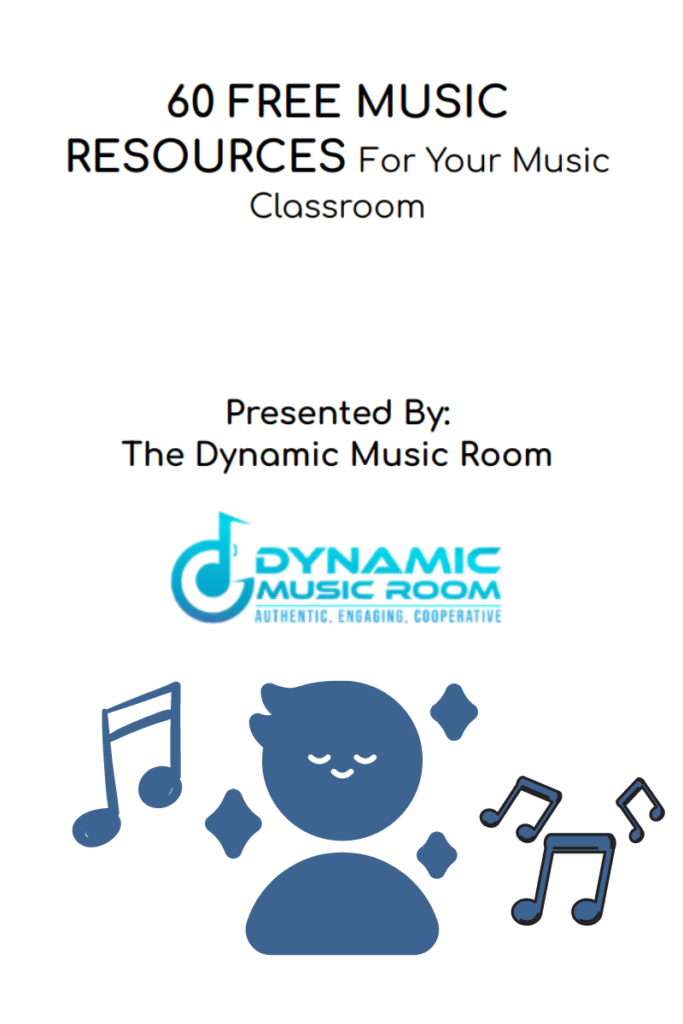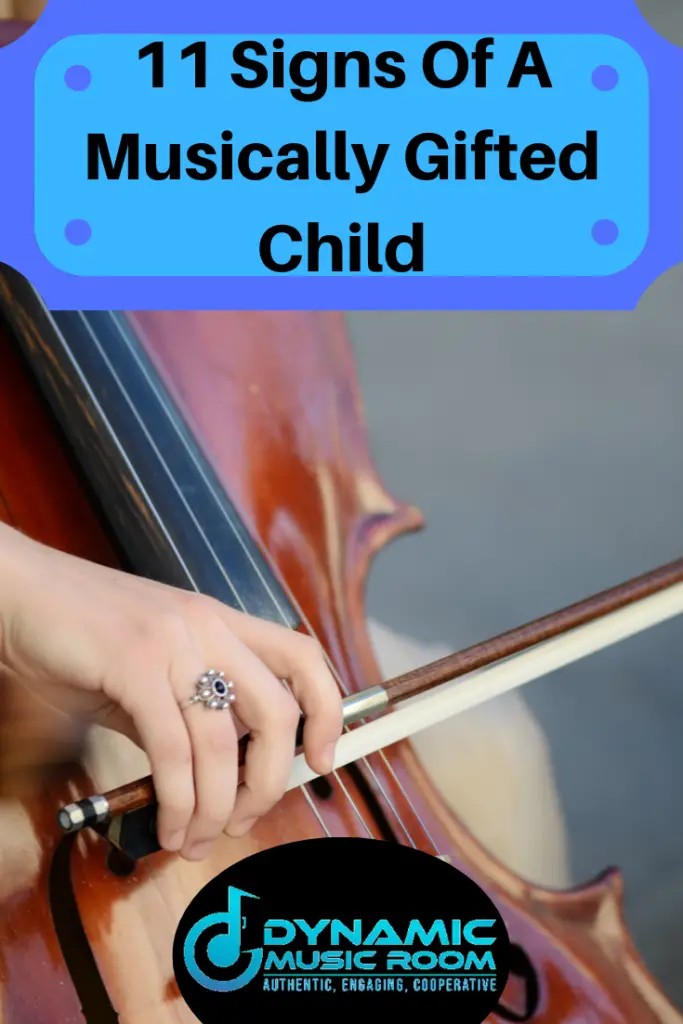Do you think your child or one of your students is musically gifted?
I am often asked this by parents and even wondered it about my own kids. I didn’t have a clear answer for this, so I did some research on the 11 signs of a musically gifted child.
Signs your child or student may be musically gifted include:
- Musically-responsive movement
- Response to good (and bad) sounds
- Listening for music in the world
- Hearing songs or melodic ideas all around
- Instrument playing by ear
- Matching pitch
- Picking out harmony lines
- Heightened emotional response
- Musical people in their family
- Sustained focus on music
- Enjoys music!
Check out the rest of the post for more details and answers to related questions.

Save time with these 60 FREE Music Resources to use in your room right away!
Stop searching the whole internet to find good activities. I’ll help you cut to the chase with my favorite 60 FREE resources.
Table of Contents
What Makes A Person Musically Gifted?
It’s unsure what exactly makes a person musically gifted. Is it the genetics of the child or the exposure to music from infancy?
Most likely, it’s a combination of the two.
Someone with inherent musical talent will find it easier to pick songs out from listening and play them on a variety of instruments.
The understanding of music comes naturally to them because their brain processes the aural information at another level.
They can do everything you’d expect a highly-talented musician to do with practice, listening, and effort.
So is this to say a “normal” person will never make a successful musician?
Of course not!
In my experience teaching music for over 10 years and being a musician myself for over 20 years, the only difference between a musician with natural talent and “average” talent is time.
The average person will take longer to learn and master what the natural does quickly. But time and effort is the great equalizer, and there are many gifted musicians who end up walking away from music because they never developed good practice skills.
However, if you have a student or child who has loads of musical talent, you may want to push them into an advanced Arts program to build these good practice skills and maximize their talent.
11 Signs Of Children With Musical Talent
Now that we’ve talked about what musical talent can do, it’s time to look at the signs you have a child musically gifted.
If many of these 11 signs apply to your child, speak to a music professional or Arts program in your area.
#1 Musically-responsive Movement
Surprisingly, one of the key indicators for musical talent in young kids is how they respond to music with their bodies.
Someone with high musical talent naturally feels all the elements of music. Children don’t have the vocal or technical skill on instruments to match this, so they follow along with their bodies.
Watch your student or child as they listen to music.
How do they move?
Do they match the beat?
Are their motions following the melodic contour of the piece?
Do they express the style and emotion of the music?
Answering yes to these questions is a good sign for musical talent.
#2 Response To Good (and Bad) Sounds
A quick test you do for your student to see how aware they are of sounds is to have them listen to good and bad performances.
Specifically, play groups which are out of tune in spots.
Most students (and adults) may not notice poor tuning unless it’s really obvious.
Students with high aural awareness will respond negatively to out-of-tune playing.
#3 Listening For Music In The World
If your child or student finds musical sounds in the world around them, they may have natural musical intelligence.
Here are some examples of what this may look like:
- Tapping pencils or objects rhythmically
- Hearing and singing back the sound of birds or a bell
- Being drawn to the sounds of the world
- Making random noises with their voice to augment another sound in the world
- Echoing sounds back they hear
#4 Hearing Songs Or Melodic Ideas All Around
Along the same lines, a musically gifted child will be able to find songs they recognize from only a few pitches.
I see this in my classes with my high-talent students all the time in the younger grades.
I’ll play a few notes of a song, and they will be able to tell me multiple songs with those beginning pitches.
While this skill is easily taught and developed, naturally-gifted students show this from a young age.

#5 Instrument Playing By Ear
Moving farther down this road, students with high musical ability will be able to play an instrument and easily figure out songs they’ve heard before.
This would be the child who picks up the kids xylophone and discovers the first few notes of Twinkle Twinkle Little Star.
This is the kid who plays on bars on the playground and notices a few of them could be banged on to sound like Mary Had A Little Lamb.
#6 Matching Pitch
Another good sign of this talent is how well a student matches pitch with their voice.
Zoltan Kodaly, founder of the Kodaly method, believed the voice was the first and most effective tool in developing a child’s aural skills.
This belief is why almost every single music method teaches sound before symbol when it comes to teaching notes.
A gifted child in music will be able to match your pitch whether you sing it or play it on an instrument.
Note: This doesn’t mean they’ll be able to tell you the correct specific pitches. This would be more like perfect pitch which is related, but different.
#7 Picking Out Harmony Lines
One of the most difficult things in music to do is play and pick out harmonies. This is also one of the elements of music which is the most emotionally impactful.
For musicians even at the secondary or collegiate level, hearing and picking out harmonies to sing and respond to is difficult. It takes work to get good at this.
The child or student may be more talented in music if they can pick out and sing along with harmonies of pieces at a younger age.
A few students will even be able to improvise their own harmonies intentionally.
#8 Heightened Emotional Response
The trend you may have noticed with these signs comes down to observing the student’s response to music.
Another response which may indicate musical talent is an emotional one.
Does the student express the emotion of the piece accurately through movement, illustration, or discussion?
Many students will be able to tell the general feeling of a piece or section, but the musically gifted student will respond to the feeling with depth and complexity changing with the piece as it moves through the phrases.
#9 Musical People In Their Family
This isn’t a sign you will “see,” but you are able to look for it. Musical talent in its natural form does have a strong relationship with genetics.
If the child or student comes from a family with musical talent, the child has a much higher chance of being talented himself or herself.
This will probably be further impacted by the emphasis on music the household will naturally place.
For example, my wife and I don’t push music on our kids even though we’re both music teachers.
But, it comes so naturally in our lives that our children express interest in music and making their own often.
#10 Sustained Focus On Music
Young children have a limited attention span and a hard time focusing. But those with natural music gifts understand music easily, they don’t get bored with music and longer pieces.
These kids are able to listen to a longer piece without getting squirrely.
They can sit and play with an instrument or toy instrument for a long period to figure out songs and make up their own.
Children of all ages and types love music, but those with a little more can focus for surprisingly long periods of time.
#11 Enjoys Music!
Perhaps the most important sign of all, does your student enjoy music?
There can be some great talent in your child, but if they don’t love music, then they won’t want to do it.
If you force them into it, it won’t matter how much talent they have. Eventually, they’ll grow to hate it and give up.
Nurture a love for music through play, exploration, and teaching, and your student will have a life-long friend!
Is Playing By Ear A Gift?
Many people consider “playing by ear” a natural gift, and in many ways, it is. However, the ability to play a song you’ve only heard and never seen is also a trainable skill anyone can master given proper instruction and time.
One of the things people often hear about in regard to playing by ear is a talent called “perfect pitch.”
Perfect pitch is the natural ability to connect specific pitches with written music and to name the pitches based only on hearing.
It’s unknown where this gift comes from, but there appear to be several types of perfect pitch with similar results.
For example, one of the professors in my undergraduate program had perfect pitch, and he said he knew each pitch based on how the vibrations “felt” in his head.
For another example, my college roommate also had perfect pitch. But he described recognizing each pitch as a specific “sound color.”
Relative pitch for the listening most of us will practice and develop. With relative pitch, we can figure out pitches just as well in relation to one another.
Musically Gifted Test
There are many proposed “musically gifted tests” out there to determine if your child is musically gifted.
The problem with these tests is that they don’t measure true “talent.” They assess your child’s current level of musical listening ability, and this score will improve with training.
One free one you may want to use is the Tone Deafness Test.
While this test was designed to test if someone had no musical talent, if your child does well on this, they may have higher musical aptitude.
The best way to tell if your child has musical talent is a combination of the following:
- Look for the 11 signs
- Meet with a professional musician
- Observe behaviors in response to music
- Take a music aural skills test (such as the one above)
- Speak with your child about music
Conclusion
I hope you found this information on 11 signs you may have a musically gifted child.
These signs aren’t the be all end all of your child’s musical life, but it may be a sign for you to look for professional music instruction beyond normal schooling.
No in person instruction available at the time? Check out Flowkey!
This piano learning program is great for musicians at all levels. They include over 1,500 songs broken down for people to learn.
Best of all, interactive video lessons are available as well.

